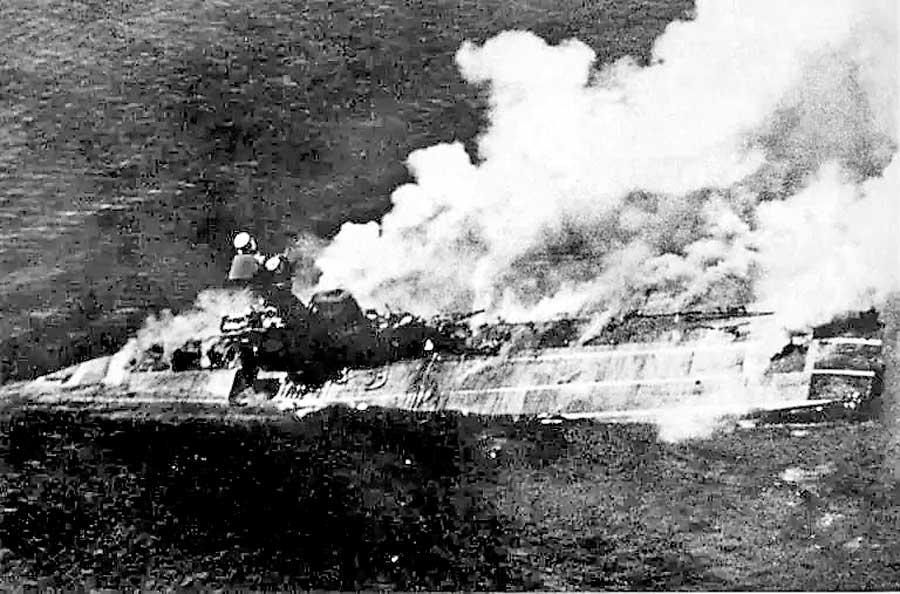04 Jul 2022 - {{hitsCtrl.values.hits}}

The Japanese Air Raid on Sri Lanka (former Ceylon), Easter 1942
In choosing my title I feel it may seem rather an arrogant one; but, when examined, it will be seen that exactly the opposite is the case.
Have they, the Japanese understood the severity? The crisis, economic or political that destroyed everything; the unity within government too, resulting in a make-shift ‘Cabinet’ drawn up haphazardly with hand-picked rejects, pole-vaulters, self-proclaimed ‘pundits’ both within and outside the Parliament and a very few honest Parliamentarians. Apart from a handful of honorable men on both sides, who are voiceless before powers that dictate, either side of the ‘Well’ in the House in Diyawanna are inundated with untrustworthy deceitful members.
There’s a long way to go before they reach the blooming or fruiting stages of the system change, that our heroic youth agitators struggle for. Petrol reserved for essential services.
Policemen are alleged to have visited several pumping stations on un-official bikes; while some education authorities have already helped their buddies by filling their tanks.
It is not practically feasible to draw lines and enforce restrictions. Racketeers are selling fuel for Rs.1200 to 1500 a litre; in fact mixtures of water/petrol too. An incident of a bottle of ‘Urine’ plus gasoline being sold for Rs. 1,000/- to a motor cyclist by a drug addict as was recorded in a CCTV. Soon there will be utter chaos with children starving and parents revolting. Will they target the roguish politicians, the rich or the upper middle class.
"Japanese military decided to destroy us by bombing on Easter Sunday but failed in their attempt on April 5, 1942, thanks to vigilant men who ruled the nation 80 years ago. Japanese failed as there wasn’t a pair like Maithri-Ranil reining the island, to ignore the intelligence warnings"
Japanese ‘Invasion’-1942
The Japanese envoy Mizukoshi Hideaki’s rather distressing statement alleged to have issued stated, ‘there is a risk of financial assistance to Sri Lanka being mismanaged and hence Japan will not support the country at this point’. Released and withdrawn? Later in the day they made amends — “Government of Japan has decided to provide an Emergency Grant Aid of US$ 3 million through UNICEF and WFP in order to provide medicine and food in a manner that would directly benefit the Sri Lankan people….”
Sri Lanka during World War II was strategically significant as a ‘stepping stone’ to India. Japanese military decided to destroy us by bombing on Easter Sunday long before Saharan got the idea: rather failed in their attempt on April 5, 1942, thanks to vigilant men who ruled the nation 80 years ago. Japanese failed as there wasn’t a pair like Maithri-Ranil reining the island, to ignore the intelligence warnings.
In consequence to the attack on Pearl Harbour, US; the Allied fleet was rushed to Trincomalee. Sir Geoffrey Layton arrived in March 1942 as the Commander-in-Chief of Ceylon. Squadron Leader Leonard Joseph who followed him arrived on April 2, did an aerial search mission, and was on his way back to base when he noticed a tiny chain of “sticks” on the horizon. Taking a closer gaze he saw seven Japanese aircraft carriers, three warships, and two cruisers, and a number of destroyers on course to the East coast, at a distant of 300 miles.
His single SOS was picked up [there were no 96 intelligent warnings like in 2019] and the whole island became vigilant. Joseph flying closer for a better view, received bullets fired by the Japanese aircraft as it crashed into the sea. He and his crew were rescued and taken to a Japanese ship and to Japan. They raided Colombo and Ratmalana the very next day. However, the Japanese were shocked when they were attacked by anti-aircraft guns bagging 31 fighter aircraft and dented 24 others, as the allied forces were well prepared. Several buildings, a submarine depot ship, two ships; an armed cruiser were badly damaged. The Ratmalana airstrip, railway workshop and running shed were partly destroyed. In a second round, they damaged a number of workshops and factories. Several Japanese fighter aircraft were destroyed at Ratmalana. A destroyer and a merchant cruiser were sunk in Colombo harbour. The British suffered grave losses in aircraft. Four days later, Japanese caused heavy damage to Trinco airport buildings and harbour, resulting in many deaths among the sailors and dockyard’s civilian workers.
"Our economic, political, and cultural life is the creation of the mixture within centuries of the civilizations of the Orient and the West. In a way Japan, regarded as a bridge between the East and the West has a great responsibility"
‘Freedom for Japan’ 1951: DS’s idea, presented by JR
At the end of the war, Japan was distraught by the atomic bombs, with most capitals in ruins. 70 years ago, in September 1951, Prime Minister DS Senanayake, presented a cabinet paper emphasizing the fact that, “We should ask for no reparations; and we should insist that Japan should recover its freedom” and instead of presenting the treaty proposal by himself, he chose the correct man the well-read Finance Minister, JR Jayewardene to lead the delegation and place the proposals.
49 nations signed ‘The Treaty of Peace’ with Japan, on behalf of the United Nations on September 17, 1951 in San Francisco, California, US. Thus peaceful relations between Japan the Allied Powers became effective from April 28, 1952, legally ending occupation and offering full sovereignty to them, amidst strong opposition from Soviet bloc. Russia wanted limitations imposed on the right of Japan to retain a defence force. JR retorted, “On the question of the independence of Japan, we agree eventually and the treaty embodies that accord. If we do not sign this treaty, none of these eventualities can take place.” We reiterated, our refusal, even to claim payment of compensation for April 1942 losses that would hurt Japan’s economy.
JR quoted the Buddha, the message of the Great Teacher, “hatred ceases not by hatred, but by love,” which he said had influenced the countless lives of people in Asia. They reciprocated the great gesture, to some extent in providing a thousand-bed hospital and a television station during JR’s stint as head of state. However, the negative or neutral response to our plea for help at this crucial juncture, though due to very valid reasons, is unacceptable in the present context.
We eagerly hope that the voice of the Sri Lankan people will receive a compassionate hearing, relieving them from the present calamitous fate, and psychological fear. Sri Lanka today faces many complexities in maintaining the source of revenue of her people. We share with Japan a history and tradition of Asian nations. Our economic, political, and cultural life is the creation of the mixture within centuries of the civilizations of the Orient and the West. In a way Japan, regarded as a bridge between the East and the West has a great responsibility.
Addressing the United Nations General Assembly on the occasion of Japan’s admission to the US on December 18, 1956, Mamoru Shigemitsu, deputy PM and foreign minister of Japan, said,
“The basis for peace and progress in Asia is to be found in the economic development of the countries of the region. The countries of Asia today are devoting their full efforts toward their economic advancement. Not a few of them require the further assistance of the United Nations and its Members in order to make their efforts more fruitful. Japan’s relations with them are those of mutual cooperation and common destiny, whether in the political or economic fields, and she hold great expectations in the growth and development of these countries.” -- Second para: item 4
Japan, you can do it! We believe in you! ‘Kimi nara dekiru; Anata ni shinjiru’.
26 Dec 2024 24 minute ago
26 Dec 2024 2 hours ago
26 Dec 2024 3 hours ago
26 Dec 2024 5 hours ago
26 Dec 2024 6 hours ago